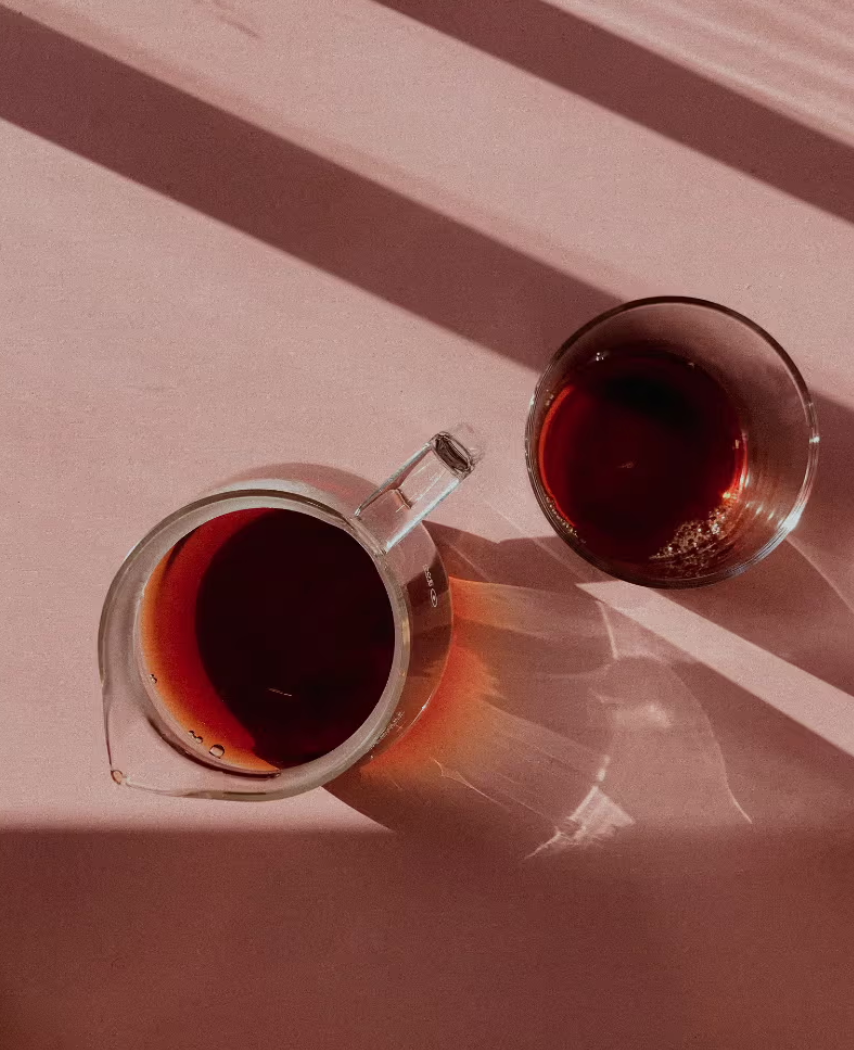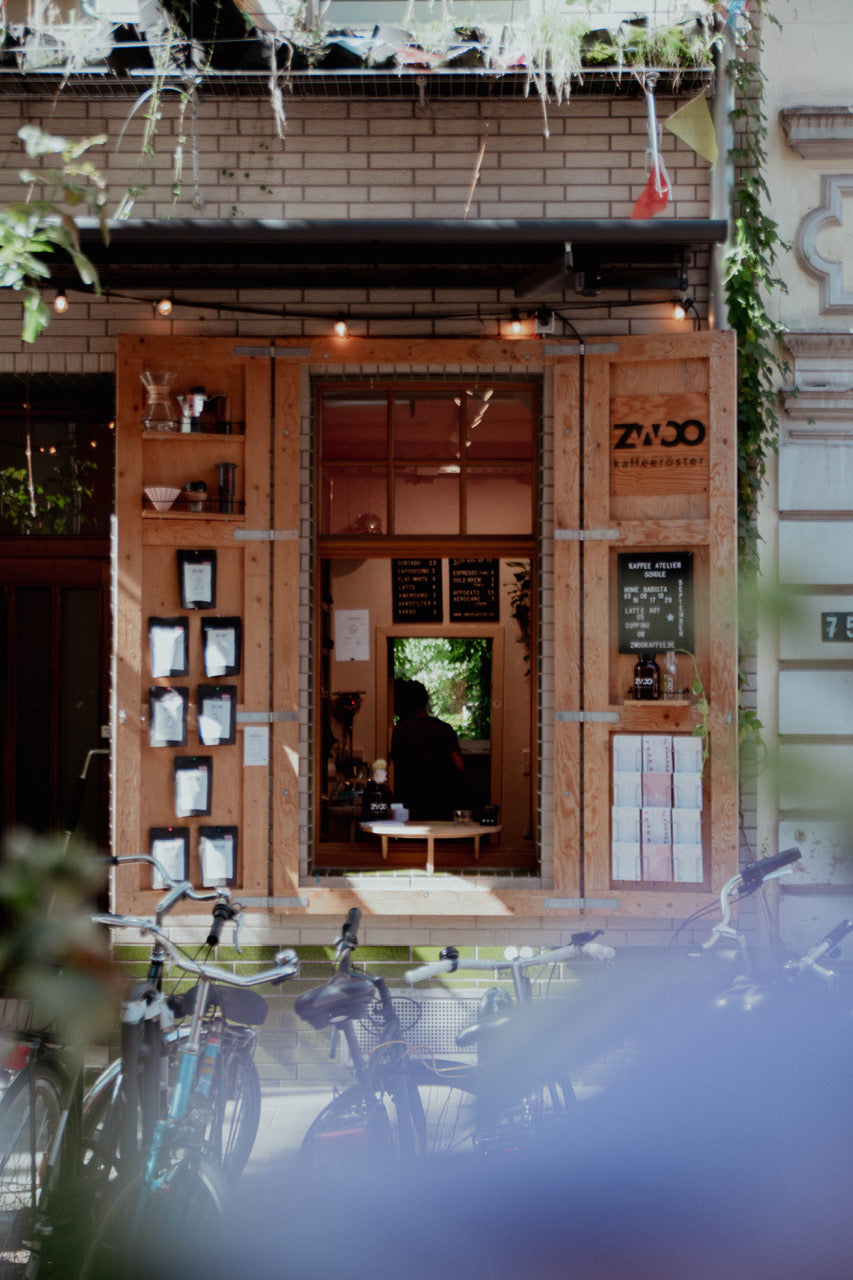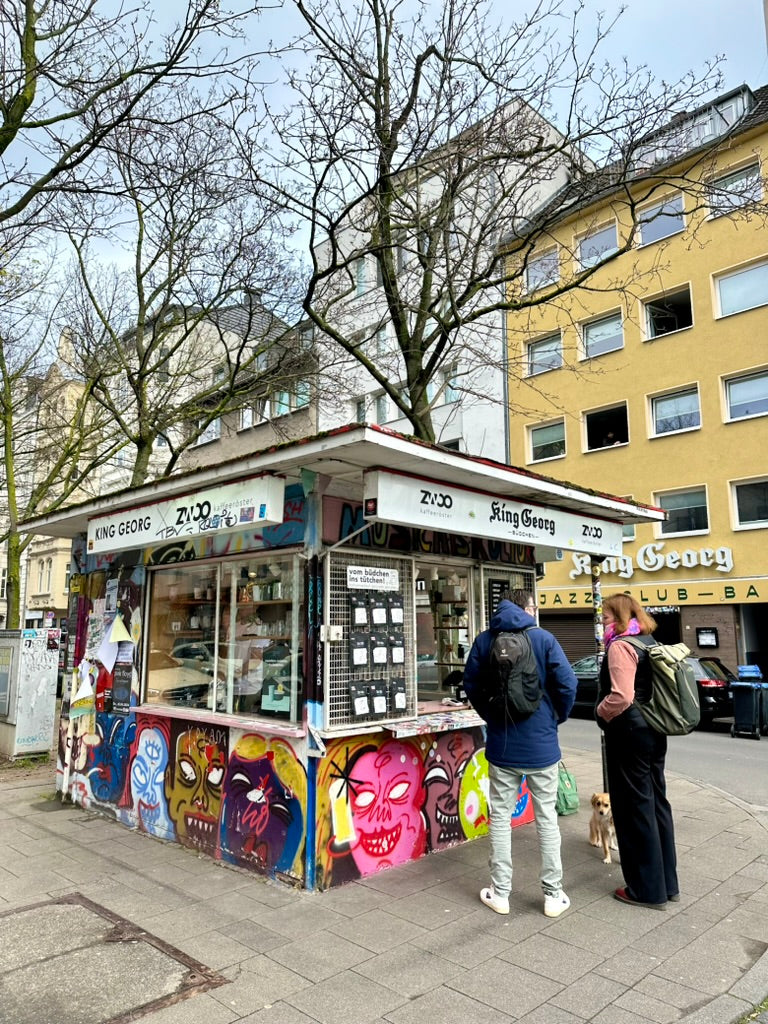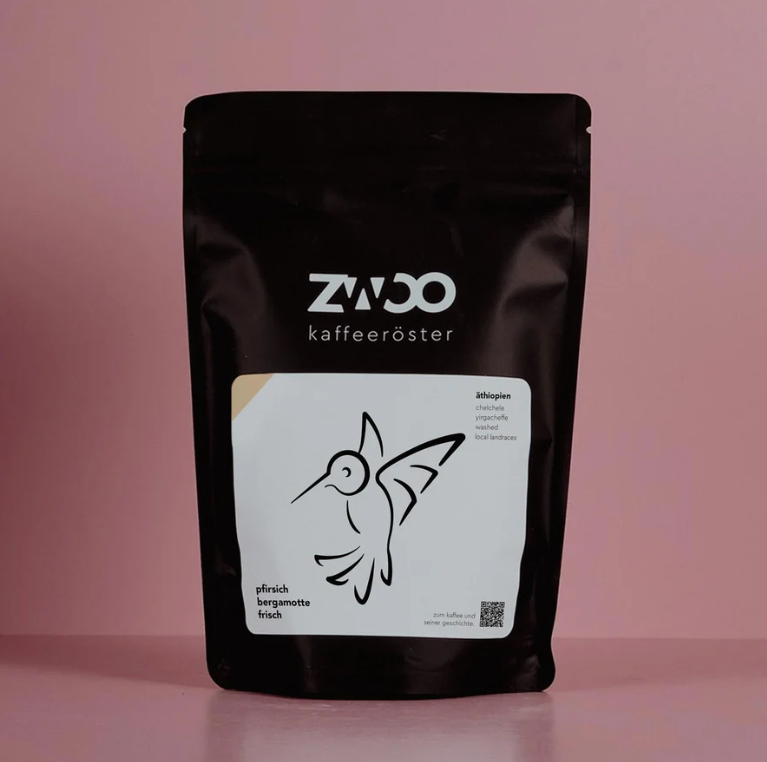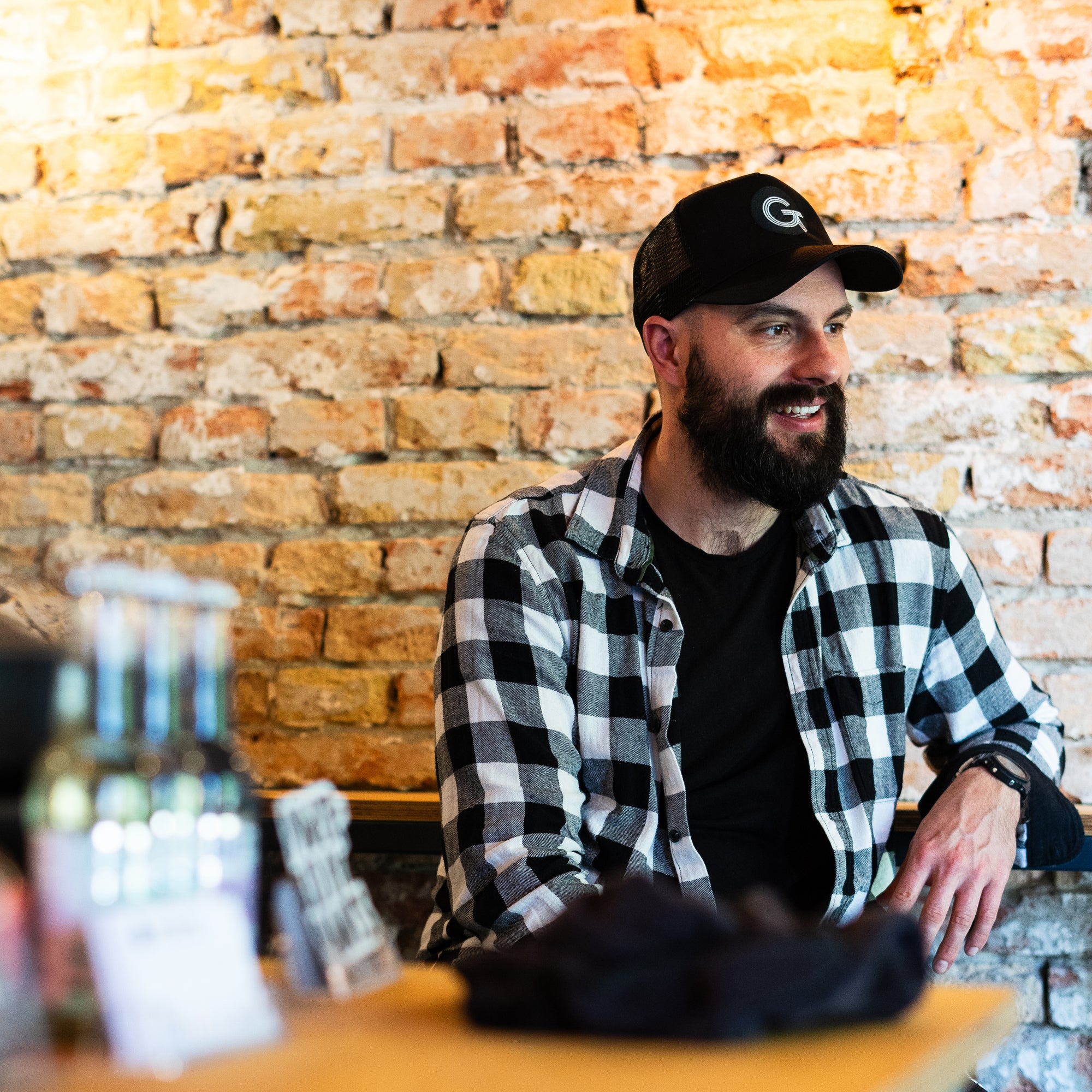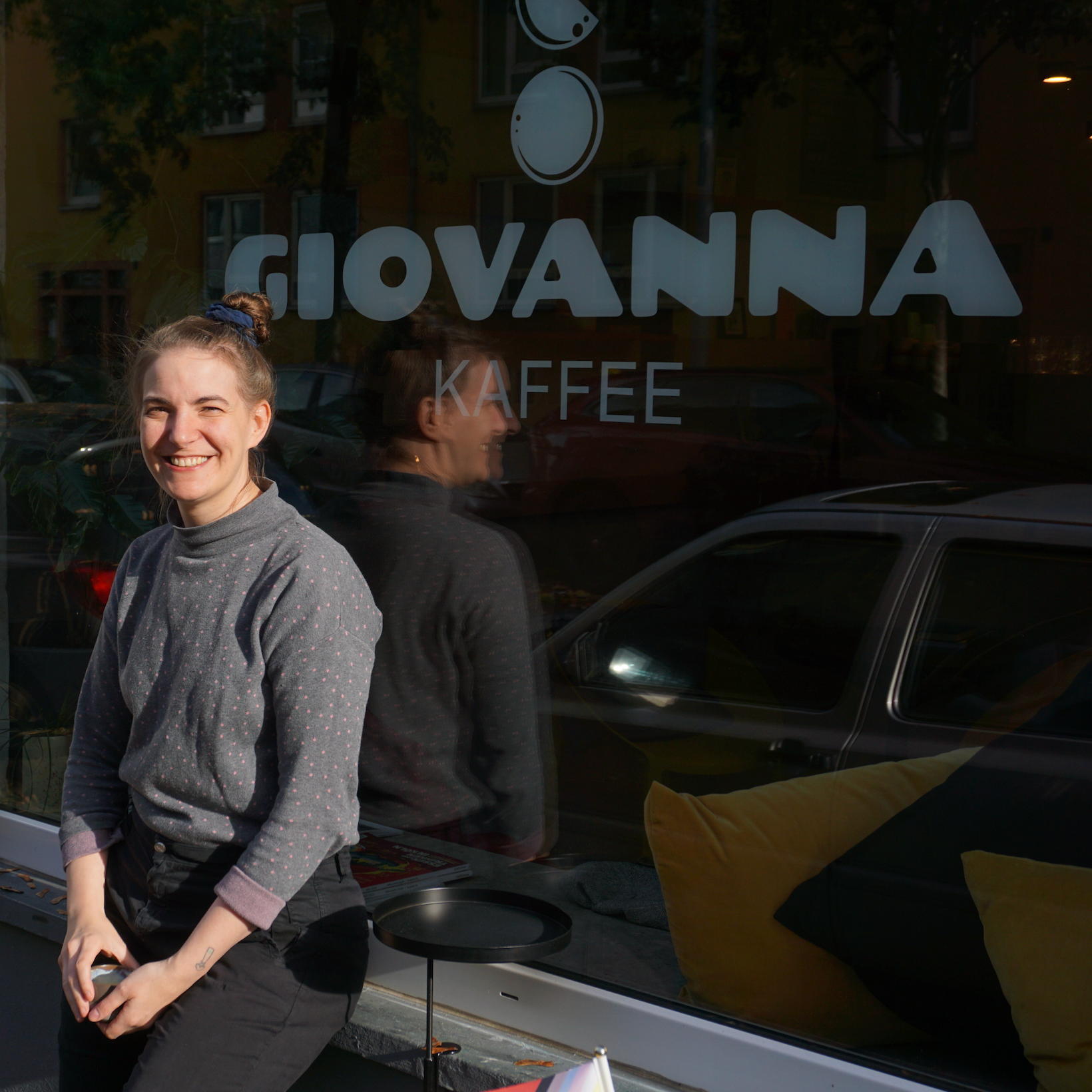I met Tilman at the Zwoo Kaffeebüdchen. It is a little coffee hut on this urban street island, facing a very busy intersection. I was a few minutes late because I got off first at the wrong stop and then walked in the wrong direction. But this led me to a stunning Magnolia tree in the Theodor-Heuss-Park. The giant and numerous pink blossoms stopped me in my tracks, and though I was late, I stopped to take a photo. Magnolia is my daughter’s name and I found this to be a special start to my day.
Tilman greeted me warmly and offered me a coffee right away. This was my first coffee of the day and I was grateful! The Kolibri roast was on batch brew this morning. A light and juicy washed ethiopian. My first sip surfaced a memory that I couldn't quite place. I felt so instantly transported, but also unclear where I went. It felt nice and nostalgic and very vivid. What an incredible experience!
I chatted with Tilman and tasted more coffee (all excellent, might I add). He spoke fondly about his dedicated team at Zwoo, clearly valuing them highly. Amidst a steady flow of customers, many of whom warmly greeted him by name, we discussed Zwoo's commitment to impactful projects in coffee-producing lands.
As we chatted and my second cup of the batch brew cooled, I took another sip and suddenly understood my taste memory. Peach! Being from North Carolina, iced sweet tea is an integral part of summer, and peach iced tea happens to be my favorite. The peach notes from the coffee transported me right back to a front porch swing in Raleigh. I decided these were definitely the beans for our Kaffeekiss box and that I couldn’t wait to make a cold brew with them!
The day was gorgeous and Tilman graciously offered tips for exploring Cologne, and a charming area I should explore by foot near the second Zwoo location. The Zwoo Kaffeefenster is a coffee window built right into the wall of a building where you can walk up and order coffee.
I asked Tilman some questions to learn more about Zwoo and what is important to them as coffee roasters. We're thrilled to have the Kolibri omni roast coffee from their selection in our Cologne Kaffeekiss box!
Nicole: Hi Tilman, how did you initially become involved in the coffee industry, and when did you start your journey into coffee roasting? From our chat I remember that you began by studying geography.
Tilman: During my geography studies I started working in a small espresso-bar and was fascinated by how diverse coffee, its origins and its flavours can be. I had the chance to write the bachelor thesis about coffee and was finally hooked by the fact that once I started learning something about coffee, the ‘learning-journey’ never stops.
I did an internship in Hamburgs Coffee Warehouses and got to understand some logistics in the industry and thereby also made a lot of contacts in coffee origin countries.
After a journey to Guatemala and Central America, I started working in a small roastery in Cologne. There I had the chance to also work on my own project of a small roastery.
N: Tell me about the name of your roastery and how you were inspired to name your coffee roasts after animals?
T: We have seen a lot of roasteries and interacted with a lot of customers before and had the feeling that many coffees were not easy to remember by just the name of the origin. That’s why we had the idea of the animals, each representing a different coffee and its characteristics.
As we started the project as two friends we combined the ‘zoo’ of animals with the two founders of the project. Zwoo was born.
N: Could you elaborate on your coffee bean sourcing process? What criteria do you prioritize when selecting beans to roast?
T: When we source coffee we are looking into three aspects: quality, impact, transparency. We only want to buy, roast and sell coffee that has unique flavours and a good quality. At the same time and just as important is that the coffee is ethically sourced and we want to make sure that we can have a positive impact in the coffee origin land. Therefore we need our coffees to be transparently sourced, so we and our customers can know who produced the coffee, where and how.
N: Zwoo is a team (or should I say family?) of fifteen now. It was clear from our chat how highly you value all the members and what they bring to Zwoo. I also understand that it’s not always you behind the roaster, but that you have the talented Lucie on your team, who is responsible for production roasting. How do you work together to ensure consistency?
T: At zwoo we value quality and taste/flavour-experience very highly. Therefore the quality team and I take a lot of time in order to ‘form/train’ (can you say that? ‘ausbilden’) each team member. After the training we also have every team member regularly visit some courses in our coffee-school in order to have all our knowledge up to date.
Lucie is not only a talented roaster, but also our filter coffee queen who writes all the new recipes you can find online or in our shops. She is so dedicated to coffee and we share our perspectives on roasting and brewing almost every week. Thereby we have a great exchange to keep the quality high.
N: It’s clear from our chat that you view coffee as more than a daily drink, but a chance to really make a difference, particularly in origin lands. Can you tell me about some of the cooperatives you work with and the impact projects you are involved in?
T: Our longest partnerships are in Guatemala and Brazil. We visited both origins and especially in Guatemala, where I was even before I started Zwoo, we are dedicated to implementing projects together with an association called ProGua e.V. who works with Guatemalan coffee farmers for more than 20 years now. Just a few weeks ago we helped build a school for the children on a farm in San Marcos close to the Mexican border.
N: During our conversation, we talked about the significance of educating consumers about specialty coffee, helping them understand why it may have a higher price tag and where their money is going and why that is so important. Zwoo hosts coffee courses and workshops at the Kaffeeschule, along with providing an impressive (and beautifully formatted) amount of free information on your website. What key aspects of specialty coffee would you like people to understand compared to purchasing commodity coffee in supermarkets?"
T: Growing, harvesting and processing coffee is a hard job that needs to be more valued by consumers. The fact that coffee farmers and so many people involved in the coffee origin earn only little money for that hard work, confirms that we have to rethink many structures in the coffee industry. I am happy that many small roasteries feel the responsibility to make a change, but I think that we (and the bigger producers/roasteries) still have a long way to go.
N: The beans in the Cologne Kaffeekiss box are your “Kolibri” roast, which means hummingbird in English. I love this name particularly because it fittingly matches the lightness of this coffee. What else should we expect from these beans? How do you like to prepare them?
T: The light omniroast makes this Ethiopian Washed coffee perform beautifully in a ‘classic V60’ recipe. The coffee even shows its clarity in Filtermachines and if you like very crisp and sparkling espresso you should try to also brew an espresso with it.
N: Can you share your favorite brewing recipe for the Kolibri?
Kolibri V60 Chelchele
Lemon candy, black tea, soft, clean, juicy
What you need:
V60
filter paper
15g Coffee
250ml Water 93*C
grind size Comandante 21’
Vorgehen:
0:00 - 0:25 gießen auf 100ml mittig
0:25 - 0:35 blooming
0:35 - 0:55 gießen auf 200ml turbulent
0:55 - 1:10 warten
1:10 - 1:20 gießen auf 250ml mittig
1:20 - 2:00 warten
2:00 - 2:30 drawdown (abtropfen)
add-ons:
wasser: Brita - kohlenfilter
sweet spot liegt bei 65*C
endgetränk 220ml
bei 1:20 leicht wirbeln
mittig = 2-3ml per sec
turbulent = 4-5ml per sec
N: Looking ahead, what are you most excited about for Zwoo or for yourself this year?
T: I am super excited to engage in more projects in coffee origins. We are trying to get more involved in our partnerships in Ethiopia by this year with our partners from Belco, who have an office in Addis Ababa.
We have some projects going on in Guatemala, where some farmers are struggling and want to help them not be dependent on coffee but diversifying their skills and incomes.
Thank you Tilman! We’re so happy to be sharing Zwoo's beans with our fellow coffee lovers!
Photos by Aleksandra Eckes



